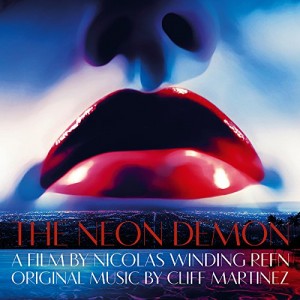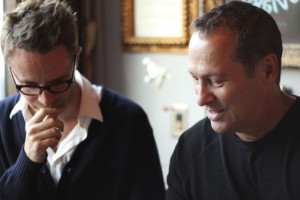
THE NEON DEMON soundtrack | ©2016 Milan Records
If there’s one thing that composer Cliff Martinez shares in common with Jesse, the nymphet model of THE NEON DEMON, then it’s that both are soft spoken while rocking peoples’ worlds. For Jesse, it’s becoming a sensation that drives LA’s fashionistas wild with desire as The Next Big Thing. For former Chili Peppers drummer Martinez, it was creating a sound of alt. rhythmic minimalism that changed the face of indie scoring with Steven Soderbergh’s SEX, LIES AND VIDEOTAPE. But if Jesse has the misfortune of attracting equally gorgeous, if far more twisted people who want to absorb the blonde essence of her corn-fed enchantment, Martinez’s sonic spell has had the far more fortunate result of attracting creative agent provocateurs – perhaps none more twisted than Nicolas Winding Refn.
A Danish director of machismo run amuck via drug pusher, a one-eyed Viking and the most dangerous prisoner in England, Refn finally hit the streets of LA for 2011’s DRIVE, a brooding salute to the criminal getaway genre that speeded into punishing, psychologically searing realms new to oft-traveled action films. Given a beyond tense protagonist who only spoke when tires, fists, and head-crumpling shoes wouldn’t suffice, Martinez’s score veered from punishing rhythm to the trademarked, glistening hypnotism of his Crystal Baschet. Martinez was no small passenger when it came to putting Refn in Hollywood’s hot seat, not that the filmmaker seemed to care when he reteamed with star Ryan Gosling unleashing the zero multiplex brutality of ONLY GOD FORGIVES. Its repellent nihilism served as the contrast to Martinez’s stunningly beautiful, dream like score that could just as easily break into percussive violence.
Now Refn provides his latest canny outrage with THE NEON DEMON, trading the artsy testosterone of his past films for the passive aggressive world of female face value, where beautiful looks are no more savage for its maddening effect on Jesse’s body and soul. It’s also quite a bit more fun (relatively speaking), and just slightly less disturbing than “Only God Forgives,” at least for Refn’s very black satire of a dog-eat-dog fashionista scene. The creepy, beyond-designed vision of THE NEON DEMON also lets Martinez loosen up as it were, making far more extensive use of his scoring to strike a haunting pose.
Reaching into an even more entertaining bag of tricks in his makeup case, Martinez goes even further back than DRIVE‘s salute to the pulsating synth 80’s action scores. Here it’s a serving of 70’s-style goodness, where rhythms reminiscent of Italian Giallos dancing on the catwalk with disco-ish grooves. LA night winds cast a fairy tale translucent spells, while bizarre samples create heart-beating body horror. It’s a trippy, hip-hop mesmerizing score that’s the definition of beauty as Refn strips away of innocence to the ugly core he knows so transgressively well, making for another notable entry in a beautiful-ugly director-composer relationship like few others.

THE NEON DEMON director Nicolas Winding Refn and composer Cliff Martinez | ©2016 Broad Green Pictures
ASSIGNMENT X: What was it about your work that put you on Nicolas’ radar?
CLIFF MARTINEZ: I was pretty uninformed about Nicolas’ work at the time that I met him. Needless to say that when I did, I was really impressed. I think his knowledge of me came from a promotional video I’d done for THE LINCOLN LAWYER for Brian McNelis at Lakeshore Records. He put me in touch with Adam Siegel who was a producer on DRIVE, who showed Nicolas the video of me playing the Crystal Baschet. That piqued his curiousity. Nicolas came over to my house, where I played the Baschet. We went out for sushi, he showed me DRIVE, and I fell in love with it. I didn’t have a lot of free time when starting DRIVE, but I was very curious about Nicolas’ work, so I watched his PUSHER movies, BRONSON and VALHALLA RISING during that early period.
AX: What inspired your score to DRIVE?
MARTINEZ: My first inspiration was the five songs Nicolas had in there already, which were homages to 80’s synth-pop. I’d just come off of LINOLN LAWYER, which had twenty songs that came from very disparate areas. Usually the songs and the score go their separate, stylistic ways, especially since I couldn’t come up with a score that would compliment hip-hop, r & b, etcetera that they had in LINCOLN LAWYER. Yet Nicolas’ approach was very unified, especially because there were far less songs in DRIVE. So I said, “I can do an 80’s synth score.” And people have been asking me to repeat the recipe ever since! Ironically, first thing that Adam Siegel asked me on DRIVE was what I thought of the songs. Then I found out that Nicolas was getting beaten up over those musical choices, which were thought to be very “un-commercial” for a film that aspired to be commercial.
AX: ONLY GOD FORGIVES was an even more punishing film than DRIVE, without any remotely likeable characters in it. What was it like scoring a movie that was defiantly un-commercial?
MARTINEZ: I liked ONLY GOD FORGIVES, and had a great experience on it. The challenge to me was that the film didn’t make as much “sense” as DRIVE, and I didn’t know if it was my job to make it more accessible. I remember asking Nicolas stuff like “What does that mean when Ryan Gosling sticks his hand into his mother?” And Nicolas responded, “What do you think it means?” I said, “Well, I don’t really know. Maybe you should let me in on it?” Then Nicolas asked me the same question again, so that was my answer! What I took from that was that ONLY GOD FORGIVES was a sort of art instillation that you could look at from different angles, and take away from it whatever you wanted to read into it. That’s another tough job for a composer, because I had to leave my music subject to interpretation as well by the audience. That’s a very different function from what film music usually does, which is to specifically create a mood.
AX: You had the opportunity to score the documentary MY LIFE DIRECTED BY NICHOLAS WINDING REFN, which his wife Liv Corfixen shot behind the scenes to chronicle the turbulent production, and reception of ONLY GOD FORGIVES. What was the difference in working with her?
MARTINEZ: That was a fun and different film, because it was a straightforward love story between a wife, husband and their family. So I thought the score would be “simpler” for that reason, music that could be played with straightforward themes throughout the film. As far as personality goes, Liv was receptive to the music. I think she made a very thoughtful film, and got her camera in places where no one else could have. It was an educational film for me as well, because it showed me a completely different side of Nicolas. It was an insightful film project.
AX: Now we get to THE NEON DEMON, which you could also call an “art installation” as such, and an eerily cold one at that.
MARTINEZ: Nicolas brought me into the process very early, even before he wrote the script. When I asked Nicolas what the film would be, he told me that the big difference was that THE NEON DEMON would be about women, whereas all of his other films were about men. Nicolas also told me it would be a very commercial film because of its theme of beauty and the obsession, which are universal ideas. I thought, “What would a Nicolas Refn movie about women be like?” And when I saw two women bathing nude in a shower of blood, I said “Oh, of course! I should have seen that coming! That’s the kind of ‘women’s’ movie Nicolas would make!”

THE NEON DEMON | ©2016 Broad Green Pictures
AX: THE NEON DEMON is full of sinister, saturate colors that bring to mind horror Giallos like SUSPIRIA. In that way, your score certainly captures the Italian vibe of such prog-rock composers like Goblin.
MARTINEZ: I’m glad you think so. I didn’t spend a lot of time watching Dario Argento films or listening to their scores. But the ones I saw made a big impression on me, and Nicolas. We talked about Goblin and musicians like John Carpenter. I think Nicolas trusts the music department more with each film, and he wanted to rely on my score more for THE NEON DEMON than with any other project we’ve done together. Usually with most films I expect the music to be in the background, and to take a backseat to everything. The less intrusive the music is, the more successful it is. But here Nicolas wanted me to rebel against that philosophy, and to be front and center stage most of the time. I think that’s great, because scores like Goblin’s “Suspiria” are really in your face, like a rock band would be. There’s nothing subtle about them, and THE NEON DEMON‘s score has many moments like that.
AX: One particularly challenging cue was Jessie’s big coming out during a fashion show.
MARTINEZ: Yes, it’s a really pivotal moment in the film where her character blossoms into fame. You’d expect that the scene, and its music would look and sound exactly like you’d expect. But it takes a completely left turn, which I thought was a great opportunity for the music to do the same thing.
AX: Usually when you have models strutting their stuff, there’s throbbing, disco-ish music playing. How did you want to skew those expectations as well?
MARTINEZ: I wanted that style to be part of the score. But as these are very weird fashion shows, they brings in that Goblin / John Carpenter presence. But then, my recipe for originality is to steal from two sources and then combine them into something original!
AX: With the characters so devoid of emotion in Nicolas’ films, was giving a sense of emotion especially important here?
MARTINEZ: I think so. Yet Nicolas’ musical aesthetic is not to explain everything, and not to be too on the nose about emotion. So I think THE NEON DEMON has a lot of ambiguity as to who these characters are and what they’re feeling. I definitely had to respect that, because you don’t want the music to close off the audience’s interpretations of the characters.
AX: For me, THE NEON DEMON is the most darkly satirical of Nicolas’ films. Did you want to capture that subversive Hollywood humor?
MARTINEZ: I work on a movie in a darkened room with no feedback, or anyone else watching it. So it can be shocking to see what a preview audience finds funny. I’ve watched THE NEON DEMON with an audience, and I think humor was just about the last thing that revealed itself to them. So I’m not so sure how “funny” THE NEON DEMON is, and I didn’t try to play it that way. I think you could describe the score as being flamboyant and exuberant. I also wanted to play up the “kitsch” factor, though I hate to use that word. But there is a campy quality to THE NEON DEMON which inspired me as well to use that 70’s approach.

THE NEON DEMON | ©2016 Broad Green Pictures
AX: Do you think in terms of your composer-director collaborations that Nicolas has the most common with Steven Soderbergh?
MARTINEZ: That’s a tough one, but I think so. Both like ambient, textural and atmospheric music – simple music that generally doesn’t say too much. But that changed for Nicolas with THE NEON DEMON. As directors, I think he and Steven couldn’t be more disparate. Their cinematic influences, and they way they’ve evolved as filmmakers, are very different. Steven is very super-realistic, while Nicolas is super-surreal. I think he’s come to rely on less and less dialogue with each film. When it comes to styles, Nicolas likes electronic music. Steven was never a very electronic guy until CONTAGION came along.
AX: Nicolas’ movies come with a lot of outrage, no more so than with THE NEON DEMON. Do you ever find yourself shocked by his work, and do you think that controversy is a big selling point of his movies?
MARTINEZ: Ever since I watched Ryan Gosling stomp someone’s head in with DRIVE, I’m not shocked by anything in Nicolas’ films. If he isn’t trying to irritate somebody, then I don’t think he’s doing a very good job. I’ve thought the same thing about music. I’ve always enjoyed music that was controversial. I always gravitated towards music that my parents would hate. That was very useful in my collaborations with Nicolas. He’s on that edge, and part of his appeal is that he’s doing something “wrong.” I think that’s probably a good thing.
AX: What do you want people to get from the score of THE NEON DEMON, especially given the score’s expanded presence in it?
MARTINEZ: I think the ultimate compliment, and Nicolas would likely disagree with this a lot, would be to repeat the DRIVE experience. That felt like the kind of minimalist, ambient and electronic score I’d been doing for years, ever since SEX, LIES AND VIDEOTAPE. And for some reason, DRIVE became the most popular soundtrack album I’d ever been a part of. I think a lot of that has to do with the songs. In the end, the whole experience of THE NEON DEMON was truly remarkable. To repeat that in the same way as “Drive” would be fine with me!
THE NEON DEMON opens June 24th, with its soundtrack available on Milan Records
Buy the score to THE NEON DEMON HERE
Buy the score to DRIVE HERE
Buy the score to ONLY GOD FORGIVES HERE
Buy the score to MY LIFE DIRECTED BY NICOLAS WINDING REFN HERE
Visit Cliff Martinez’s website HERE
Follow us on Twitter at ASSIGNMENT X
Like us on Facebook at ASSIGNMENT X
Article Source: Assignment X
Article: Interview with THE NEON DEMO composer Cliff Martinez
Related Posts:











